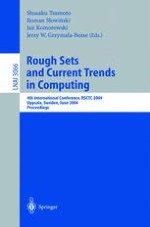2004 | OriginalPaper | Buchkapitel
Rough Truth, Consequence, Consistency and Belief Revision
verfasst von : Mohua Banerjee
Erschienen in: Rough Sets and Current Trends in Computing
Verlag: Springer Berlin Heidelberg
Enthalten in: Professional Book Archive
Aktivieren Sie unsere intelligente Suche, um passende Fachinhalte oder Patente zu finden.
Wählen Sie Textabschnitte aus um mit Künstlicher Intelligenz passenden Patente zu finden. powered by
Markieren Sie Textabschnitte, um KI-gestützt weitere passende Inhalte zu finden. powered by
The article aims at re-visiting the notion of rough truth proposed by Pawlak in 1987 [11] and investigating some of its ‘logical’ consequences. We focus on the formal deductive apparatus $\mathcal{L}_\mathcal{R}$ [12], that is sound and complete with respect to a semantics based on rough truth (extended to rough validity). The notion of rough consequence [4] is used in a modified form to formulate $\mathcal{L}_\mathcal{R}$. The system has some desirable features of ‘rough’ reasoning – e.g. roughly true propositions can be derived from roughly true premisses in an information system. Further, rough consistency [4] is used to prove completeness. These properties of $\mathcal{L}_\mathcal{R}$ motivate us to use it for a proposal of rough belief change. During change, the operative constraints on a system of beliefs are that of rough consistency preservation and deductive closure with respect to $\mathcal{L}_\mathcal{R}$. Following the AGM [1] line, postulates for defining revision and contraction functions are presented. Interrelationships of these functions are also proved.
